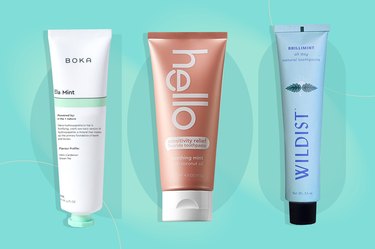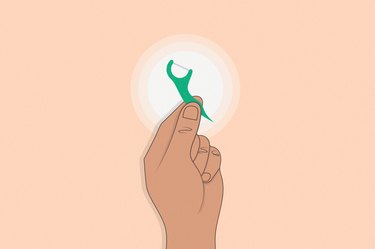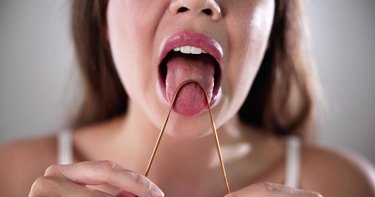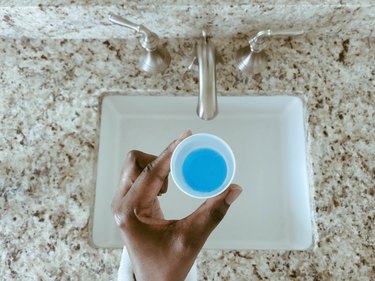
Is fluoride toothpaste bad for you? It's a question that sparks a lot of debate and confusion. On one hand, fluoride is celebrated as a hero in the fight against cavities; on the other, it's sometimes painted as a toxic substance. So, what's the real story?
Let's cut through the noise, explore the benefits and risks and help you decide what's best for your teeth and overall health.
Video of the Day
Video of the Day
What Is Fluoride?
Fluoride is a mineral that helps prevent cavities and strengthens bones. It's naturally found in soil, water, plants and some foods, although usually in pretty low levels, according to the Office of Dietary Supplements (ODS). That's why fluoride is often added to public tap water — creating "fluoridated water" — to support dental health.
Most of the fluoride Americans get comes from drinking fluoridated water and eating foods or drinking beverages made with it, like tea and coffee. It's also a key ingredient in toothpaste and other dental products.
Once fluoride enters your body, around 80 percent of it is absorbed through the gastrointestinal tract, per the ODS. Adults retain about 50 percent of that absorbed fluoride, which mostly gets stored in bones and teeth, while the rest is flushed out in urine. For kids, fluoride retention is even higher — up to 80 percent — because their growing bones and teeth soak up more of this mineral, according to the ODS.
Fluoride Benefits
Fluoride might just be your teeth's best friend, working behind the scenes to keep cavities at bay and your smile strong. Here's why it deserves a spot on your bathroom counter.
It Helps Prevent Cavities
Fluoride is best known for strengthening tooth enamel, the outer layer of your teeth, making it more resistant to acids that cause cavities, says Marina Gonchar, DMD, orthodontist and founder of Skin to Smile.
It also helps reverse early signs of tooth decay by promoting remineralization, Dr. Gonchar says. Additionally, fluoride disrupts the formation of plaque, a sticky film of bacteria that contributes to cavities and gum disease, according to the University of Utah Health.
It’s Accessible and Affordable
Fluoride is widely accessible and affordable, making it an easy and cost-effective way to prevent tooth decay, especially for communities with fluoridated water supplies, Dr. Gonchar says.
Fluoride Risks
Fluoride use is beneficial in the right amounts. As with many things, "the dose makes the poison," says Chrystle Cu, DDS, co-founder of Cocofloss. In other words, too much fluoride can lead to side effects.
Most fluoride concerns stem from excessive exposure, often in areas with naturally high fluoride levels or through misuse of fluoride products, Dr. Gonchar emphasizes. When used as directed, fluoride's cavity-fighting benefits far outweigh the potential risks, she says.
That said, here are the main concerns of excessive fluoride use.
Dental Fluorosis
Excess fluoride during childhood can lead to dental fluorosis, which appears as visible white streaks, brown stains or pitted enamel on your teeth, Dr. Gonchar says. Fluorosis often occurs when young children ingest too much fluoride from toothpaste or supplements in areas with fluoridated water, according to the Oral Health Foundation.
Skeletal Fluorosis
While extremely rare, prolonged, excessive fluoride intake can lead to joint pain and structural changes in bones that can weaken the skeleton, Dr. Gonchar says.
Kidney and Thyroid Concerns
Individuals with kidney issues may struggle to excrete fluoride efficiently, leading to prolonged exposure, Dr. Gonchar says. High fluoride levels have also been linked to potential thyroid suppression, though such effects are rare, she says.
Potential Neurotoxicity
Preliminary research suggests high fluoride levels may affect brain and nerve health. In lab animals, too much fluoride appears to be toxic to brain and nerve cells, according to the Harvard T.H. Chan School of Public Health.
Some human studies have linked excessive fluoride exposure to reduced IQ and cognitive issues in children, Dr. Gonchar says. However, it's important to note these findings are in populations exposed to fluoride at far higher levels than what's typical in the U.S. More research is needed to fully understand this possible link, she says.
How Much Fluoride Do You Need?
Daily fluoride needs vary by age and sex.
For toddlers, the adequate intake is 0.7 milligrams per day. Adults assigned female at birth need 3 milligrams daily, while those assigned male at birth should aim for 4 milligrams a day, according to the ODS.
To put that in context, there are about 1.3 milligrams in a typical amount of toothpaste adults use and about 0.22 milligrams in a cup of coffee brewed with fluoridated water, per the ODS.
To prevent unnecessary exposure, children should be supervised when they're brushing, and they should use only the recommended amount of toothpaste to ensure that it is spit out and not swallowed.
Safe Fluoride Toothpaste Use
Because fluoride needs vary by age, the right amount of fluoride toothpaste does too, per Dr. Gonchar:
- Young children: Use a rice-grain amount if they cannot spit effectively.
- Older children: A pea-sized amount is safe.
- Teens and adults: Use enough to cover about two-thirds of your toothbrush head.
Who Should Avoid Fluoride Toothpaste?
Certain groups are more vulnerable to fluoride's side effects, per Dr. Gonchar:
- Children under 2: Young children should only use a smear of fluoride toothpaste (the size of a grain of rice) or avoid it entirely to prevent accidental ingestion.
- Individuals with fluoride sensitivity or allergies: These folks should choose fluoride-free products to avoid irritation.
- People with kidney or thyroid issues: Talk to your doctor about managing your fluoride intake effectively.
- Residents in areas with high natural fluoride levels: Limiting fluoride exposure can help prevent fluorosis. (These are areas with, for example, a lot of volcanic or geothermal rock, according to August 2022 Nature Communications research.)
What About Fluoride in Water?
All water contains some fluoride, but the levels depend on where you live. Only a few regions naturally have enough fluoride to support dental health, so in many areas, it's added to public water supplies.
Since 1962, the U.S. Public Health Service has recommended fluoridating tap water to combat dental caries, a common chronic disease in children, according to the ODS. Today, the recommended fluoride concentration is 0.7 milligrams per liter of water — enough to prevent cavities while minimizing the risk of dental fluorosis. Studies show water fluoridation reduces tooth decay by 40 to 60 percent, per the Oral Health Foundation.
Wondering how much fluoride is in your tap water? Your local water supplier can provide specifics, or you can check the Centers for Disease Control and Prevention's online tool for fluoridation details. If you live in an area where fluoride levels are high, consider using a fluoride-free toothpaste to avoid possible side effects.
Fluoride Toothpaste Alternatives
If you're looking to limit fluoride use or explore other options, plenty of effective alternatives exist. That said, some of these alternatives, such as natural toothpastes and those with essential oils, may not prevent cavities as effectively as fluoride-based products, according to the University of Utah Health.
Hydroxyapatite Toothpaste
Made from the same mineral as tooth enamel, hydroxyapatite helps remineralize and strengthen teeth, preventing decay, Dr. Gonchar says. A synthetic version called nano-hydroxyapatite (or n-HA) has been widely used in Japan since the 1980s and is gaining popularity in the U.S. as a fluoride alternative, Dr. Cu adds.
Xylitol-Based Toothpaste
Xylitol, a natural sugar alcohol, inhibits the growth of harmful bacteria in the mouth, creating a healthier oral environment, Dr. Gonchar says.
Toothpaste With Essential Oils
Essential oils like peppermint, eucalyptus, clove and tea tree oil offer antibacterial properties that support oral health, Dr. Gonchar says.
Other Natural Toothpastes
Ingredients like coconut oil and aloe vera boast antimicrobial and anti-inflammatory benefits, promoting a healthier mouth, Dr. Gonchar says.
The Bottom Line
Fluoride is a safe and effective way to protect against cavities when used responsibly. For most people, fluoridated water and toothpaste offer a simple and reliable defense against tooth decay.
Still, fluoride is just one piece of the dental health puzzle. According to Dr. Cu, maintaining a healthy diet and solid oral hygiene habits are even more critical. Her top tips:
- Limit sugary and processed foods: Bacteria thrive on these, increasing the risk of cavities. Focus on whole foods to protect your teeth.
- Brush and floss daily: Brush twice a day and floss every night to disrupt plaque and prevent decay and gum disease.
- Visit your dentist regularly: Aim for checkups and cleanings every six months to catch issues early and keep your smile healthy.
Tip
After eating sweets, it's best not to brush your teeth right away. Instead, rinse your mouth with water, and wait at least 30 minutes before brushing. Don't rinse with milk, which is loaded with sugar.
- ODS: “Fluoride”
- Oral Health Foundation: “Fluoride”
- Harvard T.H. Chan School of Public Health: “Is Fluoridated Drinking Water Safe?”
- University of Utah Health: “Are There Benefits to Using Fluoride-Free Toothpaste?”
- Nature Communications: "Global analysis and prediction of fluoride in groundwater"
- National Toxicology Program: "Fluoride Exposure: Neurodevelopment and Cognition"
Is this an emergency? If you are experiencing serious medical symptoms, please see the National Library of Medicine’s list of signs you need emergency medical attention or call 911.




